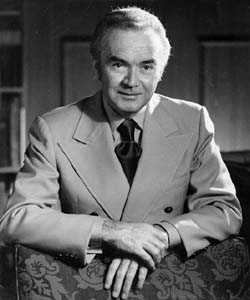
Year Born: 1914
Year Died: 1988
Year of Induction: 1997
Pioneer – Member of CAB Hall of Fame
Byles, William D. “Bill” (1914-1988)
Bill Byles earned the nickname “The Starmaker” from his colleagues in the broadcasting industry.
Born in Owen Sound, he found work in the big city as a 16 year-old compositor for Marketing Magazine. That led to a minor position in radio at the Philip Massey Advertising Agency. He then joined Campbell-Ewald Advertising – later Maclaren – and Bill found his niche as assistant to Radio Director C. M. “Pass” Passmore, remembered by many as the “dean” of Canadian Radio.
Under “Pass”, and later as Radio Director of Spitzer & Mills Advertising, Bill produced and assisted in the production of many of Canada’s pioneer radio shows. Wayne & Shuster were spotted by Bill and the late Maurice Rosenfeld in the “U. C. Follies Show” and they put their first program on the air – “The Javex Wife Preservers”. There were also the General Motors – and later the Imperial Oil – Hockey Broadcasts. Vancouver’s “Allan Young Show”, and the “Gordon Sinclair Show”, were among others fopr which they were responsible.
Probably their best remembered series was (sound effect) knock, knock – “Who’s There? It’s the Happy Gang”! For 15 years, Monday through Friday, this daytime program was the most popular show on radio, even exported in 1943 to the Mutual Network in the U.S.
With all of these shows, Bill was able convince the CBC Network as well as the sponsors to add members to the orchestra or hire more writers, whatever it took to enhance the quality of the program. Truly, he was a “Starmaker”!
That was Radio. In the early days of Television he continued that role. Bill joined Young & Rubicam, the largest radio and television advertising agency in the U. S., and was dispatched to New York to study all the aspects of this new medium. Back in Canada, Bill became deeply involved in the formation of Canada’s TV industry. He chaired a committee on realistic commercial rates during the infancy of the CBC Network and worked with the public broadcaster and various unions in negotiating rates and working conditions.
Bill Byles’ influence was also felt in the film production community as he pioneered the production in Canada of film television commercials for his clients, while most other agencies continued to shoot in the U. S .
After 26 years in the advertising agency business, Bill became a partner in the Horace N. Stovin Company which acted as sales representatives for 28 radio and television stations. The name of the company became Stovin Byles Ltd. Shortly after the death of Horace Stovin in 1964, Bill acquired ownership of the company and became President.
Once again, Bill was the trailblazer in the business, commissioning a study by an Ottawa economics professor to determine the future of the broadcast advertising industry. The Firestone report, entitled “Broadcast Advertising in Canada, Past and Future Growth” went on to help the Federal Government in decisions in the broadcasting field but also in other areas such as consumer credit.
Outside his active role in broadcasting, Bill Byles became a partner in the Celebrity Club, a well known Toronto lounge and dining place for the broadcast industry. He also owned several buildings in Toronto, a hardware store in Bobcaygeon (near his summer home), a fishing camp in the Maritimes and a barbershop in downtown Toronto called Chez Margo.
Bill was a practical joker. Nothing was too much trouble, from installing a life size totem pole on someone’s front lawn to filling their swimming pool with goldfish. He worked hard and played hard, with many occasions where the two were combined.
With the many changes in the broadcast industry, Byles wound down Stovin Byles in the mid seventies and enjoyed more than a decade at his country home in the Kawartha Lakes district north of Peterborough, participating in local fund-raiser and arts campaigns and satisfying his love for gardening.
He died in 1988 leaving a legacy as one of Canada’s broadcast pioneers, and inspiring four of his five children to follow in his footsteps in the industry. He did all of his deals with a handshake and will be remembered as a gentleman. A humble man with a passion for his profession, Bill said, upon receiving Canadian advertising’s highest award in 1971 – the ACA Gold Medal- “If I choke up a little, I hope you will forgive me, but I feel keenly the honour you have bestowed on me . . . and the broadcasting profession that I have the privilege of being part of today.”
Bill Byles was inducted into the CAB Hall of Fame in 1997.
Written by Ross McCreath – October, 1997
